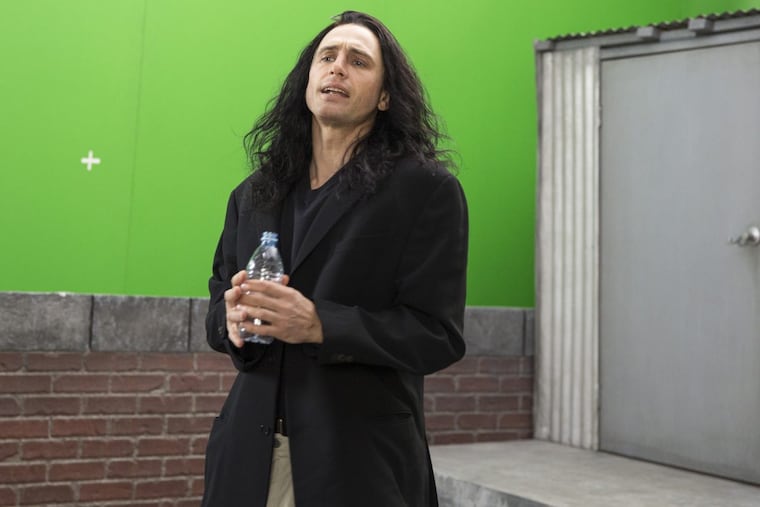James Franco talks about making a good movie about one of the worst movies ever
"The Disaster Artist" is James Franco's comic take on the making of "The Room," regarded as one of the worst movies ever made.

There are all kinds of bad movies, celebrated for all kinds of reasons, but the celebrated bad movie The Room — a fixture at midnight screenings around the world — found an early and enthusiastic following among people in the movie business.
The self-distributed stinker opened in a rented-out L.A. theater in 2003, where it was seen in an empty house by a screenwriter who began inviting his industry friends, a circle that soon widened to include Jonah Hill, Paul Rudd, Kristen Bell, and others.
All were mesmerized by the self-financed, self-made debacle — credited to its mysterious leading man and director, Tommy Wiseau, a vaguely Eastern European eccentric who wrote the love-triangle screenplay.
One of the movie's celebrity fans was James Franco, who became obsessed with the story of The Room (told in a book by one of the stars of the movie, Greg Sestero) while on the set of his own notorious movie The Interview.
He optioned the book for a movie — The Disaster Artist, opening Friday. He's both star and director, so he did it Wiseau-style, only with a bit more polish — he's been talked up for an Oscar for his role as the out-there Tommy.
Franco's first scene gets to something about the movie's special appeal to actors — set in an acting class, it features Wiseau (Franco) doing a bombastic Brando, a monologue as hideous as it is fearless.
But it's that fearlessness that catches the eye and the admiration of classmate Sestero (played Franco's brother, Dave), setting in motion the friendship that led to the movie that led to cult of The Room.
"He's so liberated and so free and so self assured than he can just let loose and do his art without regard to criticism that might shut him down. But it's that same lack of awareness that allows him to be so blindingly oblivious to how the world perceives what he is doing. That's how you get a phenomenon like The Room," Franco said.
Those in the business can't help but admire the chutzpah, and the to-hell-with-everything independence.
Scott Neustadter, the Margate-born screenwriter Franco hired, puts it this way: "We are all very used to making movies by committee. You can usually see where the studio had notes, or where the reshoots happened, or some kind of compromise of the original vision. In The Room, it's the most pure auteur experience that you can watch. It's this one guy and how he sees the world, as insane as it might be."
Franco: "There's something attractive about someone who just marches to his own drummer to such an extreme degree. And Tommy has that."
What he does not have, based on the evidence provided by The Room, is "what you would call talent in the conventional sense," Franco said.
Franco isn't being mean — he's consulted with Wiseau, and has become friends with him; he admires the way Wiseau has embraced the movie's ironic second life and profited from it. Endless revenue from the late-night fixture has repaid his initial $6 million production budget and then some (estimates are that he makes $20,000 per month on screenings and merchandise).
Wiseau, Franco said, may never win an Oscar, but he's become "a maestro at capitalizing on what people love about it."
The Room isn't good, he said, but it's meant to be, and that's what captivates people.
"I think the real kind of secret sauce is that underneath all of it — the reason it appeals to actors as everybody, the reason it's been a cult hit for 14 and a half years, is that Tommy was so sincere when he made it," Franco said.
The trick to a "making of" movie like The Room is to replicate that sincerity — to tell the behind-the-scenes story with empathy rather than ridicule.
"I can relate to Tommy. He and I had the same heroes — James Dean and Marlon Brando. Tommy was truly aiming for that level of art and performance. He just had so little perspective on himself. He doesn't really look like James Dean. As people say, he looks more like a pirate or a vampire."
What Franco sought in The Disaster Artist is the same strange uplift that people experience when they watch The Room in a theater full of fellow travelers.
"If you go to a theatrical screening of The Room, there's this weird kind of alchemy. The energy in the room is a really positive energy. There's nothing nasty about it. Especially if Tommy is there. People love the experience, and he's soaking all of that up."
Can a movie that generates that kind of good feeling be bad?
"I have watched it at least 30 times. James Dean is my hero, I've played James Dean, but that's more than I've watched any movie by James Dean. I've watched The Room more than I've watched Taxi Driver or GoodFellas, which I count as my favorite movies. Maybe it's time I stop calling it a bad movie and say, on some level, this is a good movie that I get something out of every time I watch it."